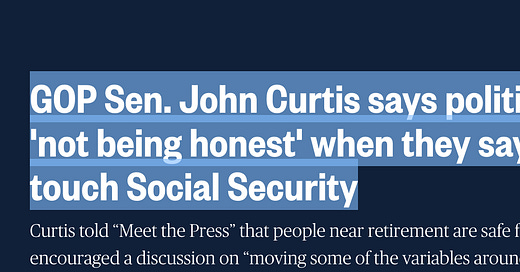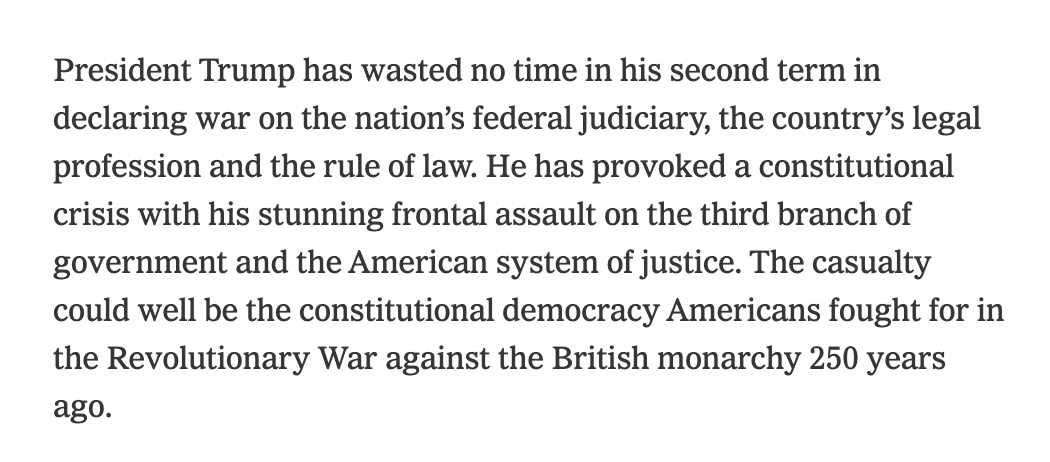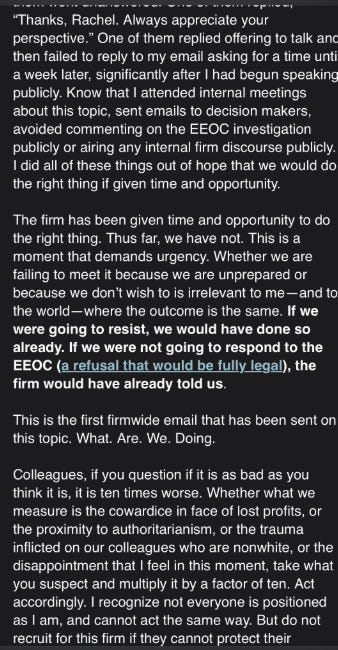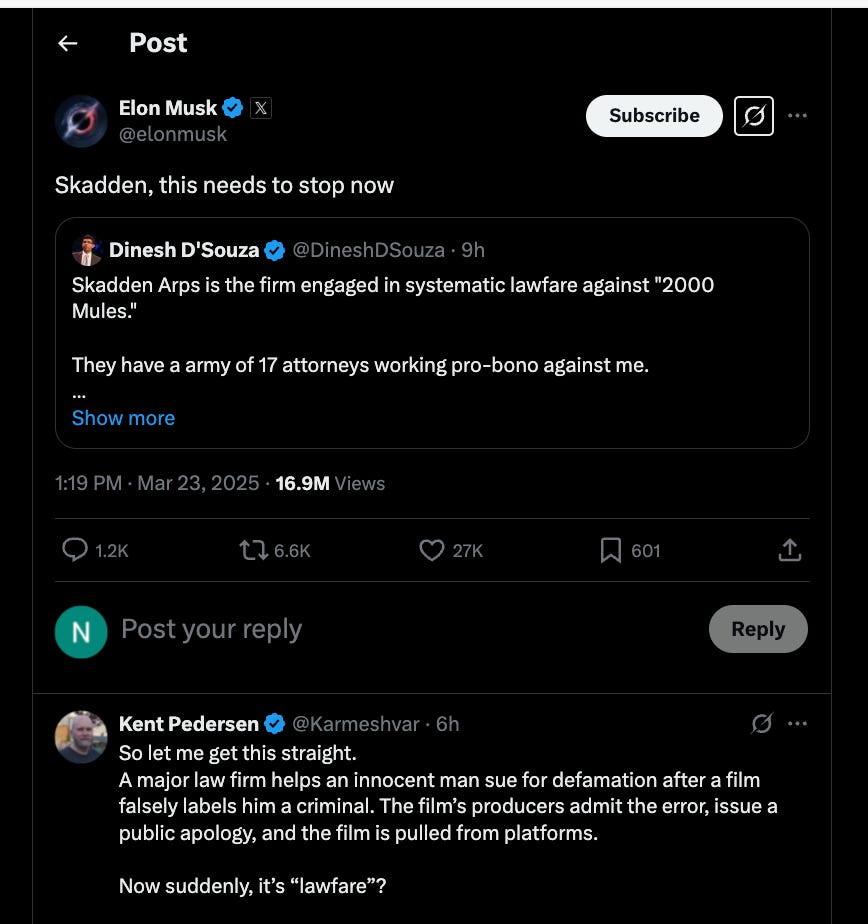The Importance of Youth Advocacy: Taking Inspiration from Rachel Cohen
Teachers will need to advocate for their students and youth will have to advocate for their future. Almost everyone else has dropped the ball.
I've pushed greater participation in speech & debate as AI has advanced because speech & debate promotes metacognitive development, communication, collaboration, creative, and critical thinking needed for an AI world, especially as AI takes over more and more routine work.
But I’ve also noted the significance of students developing advocacy skills.
As AI increasingly replaces routine and repetitive jobs, substantial employment displacement, which already starting to happen, is inevitable. This shift will significantly alter the distribution of resources and power, creating economic instability and amplifying existing inequalities. Wealth concentration in sectors controlling AI technology and related infrastructures will heighten societal divides, intensifying debates around wealth redistribution mechanisms such as Universal Basic Income (UBI). Advocacy skills become crucial here, as citizens must learn to articulate and defend their rights to resources effectively. Individuals will need sophisticated persuasive abilities to influence policy debates, secure equitable shares of wealth, and advocate for social protections against economic disruption caused by AI.
Reductions in federal agencies, like a potential downsizing of the U.S. Department of Education, signify a substantial shift of resources and decision-making authority from federal to state governments. Such changes would spark numerous conflicts, particularly concerning equitable education funding, curriculum standards, special education programs, access to resources in economically disadvantaged states, extra-co-curricular activities, standardized testing (the NAEP has already been eliminated), school lunch programs, vouchers, and charter schools. These conflicts have already existed, but will be significantly amplified by AI, likely reductions in federal funding, and weakened tax bases in an economic downturn. We already see the disagreements erupting in online forums over these issues. Teachers and parents will need to advocate for their students.
Future battles are coming over Medicaid, Social Security, Tax Cuts, and many other programs.
“Younger generations” who have no political power.
The dramatic exercise of executive power creates even more urgency.
Originally, the Trump administration said it would only go after criminals, which quickly expanded to anyone here “illegally.” This then expanded to people with visas, green cards, and temporary protected status (those who did it the “right way”). Funding for legal representation of migrant children has been eliminated. The Department of Homeland Security had three offices for protecting civil rights during deporation, but those offices have been shut-down.
Regardless of what one thinks of this, this is promoting a lot of conflict in and across communities. Advocacy is critical.
Most recently, many have begun to express alarm over the expansive interpretation (by the executive branch) of what is permitted with executive power.
Many experts, including both liberal and conservative lawyers, are warning that the United States may be approaching a constitutional crisis (and some judges have been indirectly threatened) due to the Trump administration's actions and its expansive interpretation of executive power:
Defiance of Court Orders: The administration has flirted with defying federal judges' directives, particularly in cases involving deportations and funding cuts to agencies.
Expansive View of Executive Power: The administration argues that Article II of the Constitution grants the president broad authority to protect national interests, potentially allowing for punitive actions against individuals or businesses deemed threats.
Challenges to Judicial Authority: President Trump has labeled judges who rule against his policies as "lunatic" and called for their impeachment, prompting unusual public responses from Chief Justice John Roberts.
Overwhelming the System: Some experts believe the administration is pursuing a strategy of overwhelming the judicial system with extreme executive actions, hoping the Supreme Court will validate some of them and expand presidential powers.
Today, Michael Luttig, who was appointed by President George H.W. Bush and served on the U.S. Court of Appeals for the Fourth Circuit from 1991 to 2006, wrote an editorial in the New York Times.
Recently, the law firm Paul, Weiss, Rifkind, Wharton & Garrison faced significant criticism for striking a deal with the Trump administration to avoid an executive order that threatened its business operations. The firm agreed to provide $40 million worth of pro bono legal services to support Trump's initiatives and reassess its internal diversity policies in exchange for the withdrawal of the executive order.
This decision by Paul Weiss has been met with widespread condemnation from legal professionals and scholars, who view it as a capitulation to political pressure and a threat to the independence of the legal profession.
Rachel Cohen, a third-year finance associate at Skadden, Arps, Meagher & Flom (which is now under pressure from Musk), made headlines for her bold response to the controversy surrounding Paul, Weiss's decision to yield to the Trump administration's demands. Her reaction came in the form of a "conditional resignation" letter, which she sent to her firm on March 20, 2025 (her email access was quickly turned off)
In the letter, Cohen announced her intent to resign unless Skadden took meaningful action to oppose what she viewed as the erosion of legal and ethical standards in the profession.
Cohen also helped organize an open letter signed by hundreds of associates at major firms, urging their employers to defend the independence of the legal profession and condemn Trump's intimidation tactics. In an interview with Politico, she emphasized the importance of maintaining the principle that lawyers are not personally linked to their clients' interests. She warned that targeting attorneys for their representation undermines the judiciary and threatens the system of checks and balances.
The initial reaction to the letter was, well, “she’s just an associate,” no one cares. There is an elemeent of truth to the fact that fewer people care, but what’s the alternative? The older, “wiser” partners capitulated like a cheap deck of cards, the same way the “older and wiser” Schumer did. Our older and wiser “elders” have no idea how to contest this dramatic expansion of executive power.
At least she’s organized an associates letter that now has over 1,200 signatures of other associates who have similar views. She’s speaking out. She’s trying.
What inspired her to stand up for what she thinks is right? Why she speak up before it impacted her (“Hey, they won’t cut my Social Security;” “my kid is gay, not trans;” “my client wasnt’ sent to El Savador”)?
Maybe it was her previous career.
And there has been some response from other firms.
"Duck and cover” hasn’t worked for Skadden.
Youth must develop strong advocacy skills because new economic and political configurations—driven significantly by advancements in politics, AI, and athe intersection of the two —will profoundly shape their futures and very few people are stepping up to help them.
Rather than equipping youth with the tools and knowledge necessary to navigate and influence these sweeping changes, adults have frequently chosen the easier route of trying to bury the problem (ignoring AI, a major law firm cutting a deal with Trump) policing and restricting (writing detectors, firing Cohen), refusing to use budget leverage or learn how to argue in performative/socially-mediated world (Schumer).
This failure by adults is nothing short of an abdication of their core responsibility to the next generation. As economic instability grows and political institutions shift dramatically, youth are going to have to largely fend for themselves, expected to navigate the complexities of a rapidly transforming world without the guidance or support they deserve. Sorry, getting a 1600 and being admitted to Columbia or Harvard isn’t going to help one bit.
Young people must urgently recognize this neglect and step into the breach, developing sophisticated advocacy and persuasive abilities to defend their interests, demand their rights, and influence policies that will determine their quality of life. The stakes are high, the changes swift, and the traditional safety nets dismantled. The youth of today must speak loudly and clearly because, tragically, the adults in charge have dropped the ball entirely.
PPS. The workforce reductions triggered by AI are likely trivial compared to what AI is going to bring.
PPS. Some will think this post is political. It is. Politics is about governance and the distribution of resources and power. We can’t talk about resource distriution and governance without talking about politics. But, of course, I’m primarily arguing for youth engagement.
If youth would rather live in a country where 12 million people are deported and people are sent to a prison in El Salvador where they are likely being tortured without due process, step up and argue for it because others are coming from the other side.
PPPS. Two of my friends’ kids won speech and debate championships this weekend.
There is hope.














